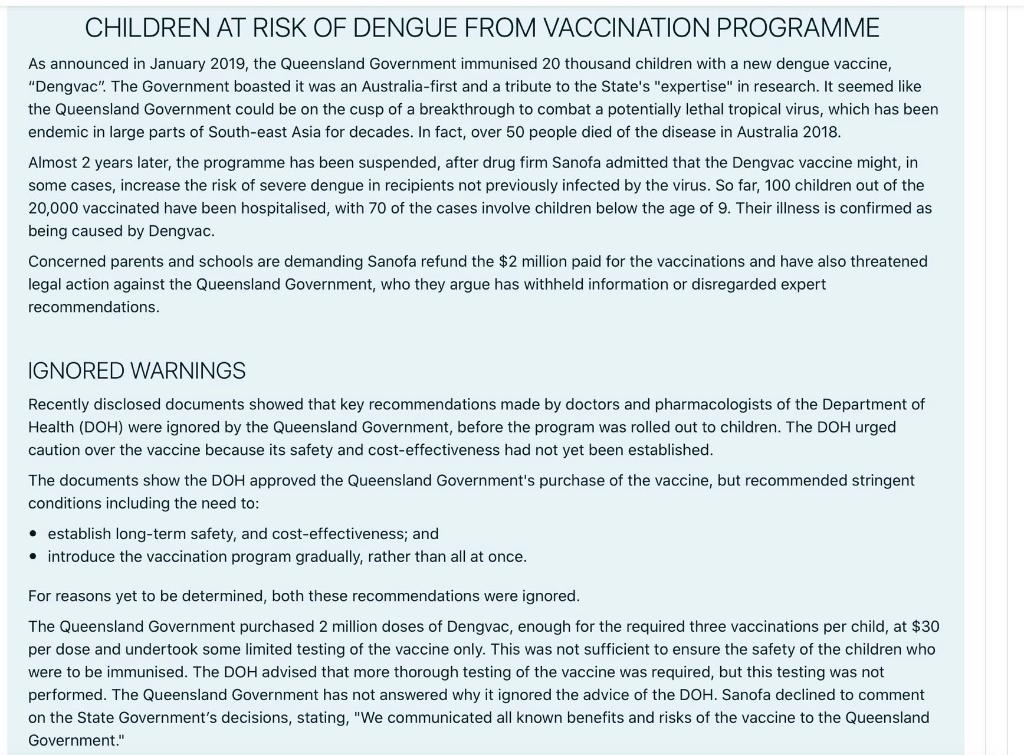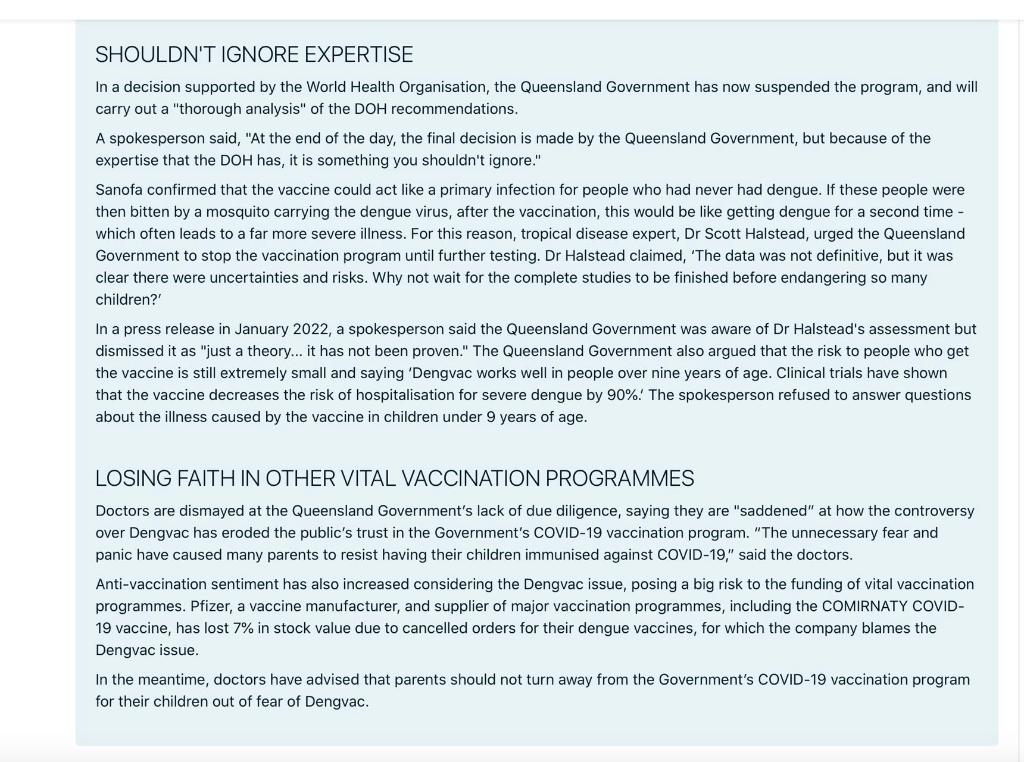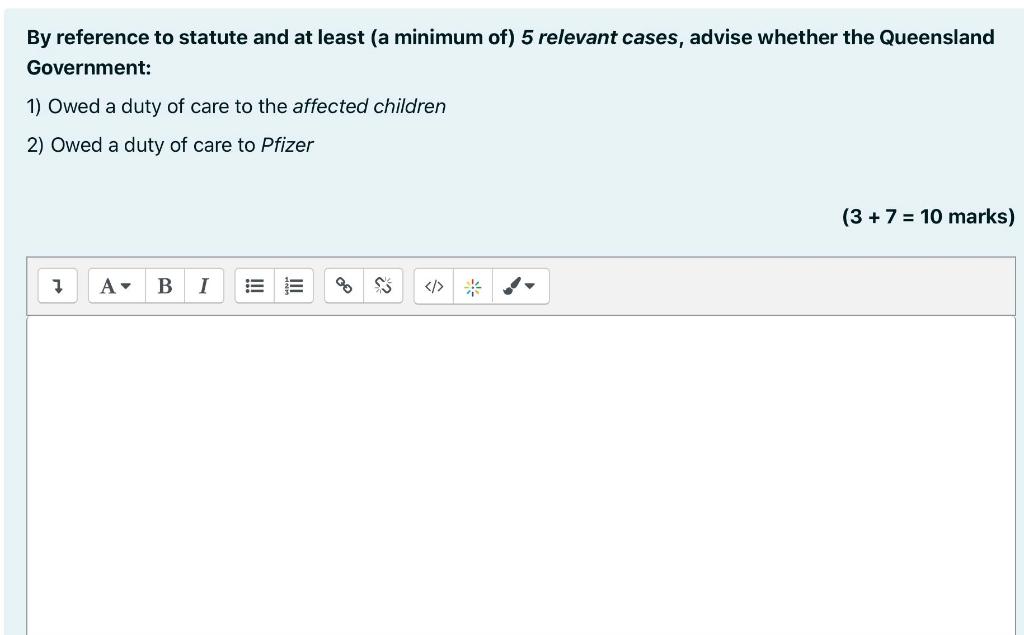


CHILDREN AT RISK OF DENGUE FROM VACCINATION PROGRAMME As announced in January 2019, the Queensland Government immunised 20 thousand children with a new dengue vaccine, "Dengvac". The Government boasted it was an Australia-first and a tribute to the State's "expertise" in research. It seemed like the Queensland Government could be on the cusp of a breakthrough to combat a potentially lethal tropical virus, which has been endemic in large parts of South-east Asia for decades. In fact, over 50 people died of the disease in Australia 2018. Almost 2 years later, the programme has been suspended, after drug firm Sanofa admitted that the Dengvac vaccine might, in some cases, increase the risk of severe dengue in recipients not previously infected by the virus. So far, 100 children out of the 20,000 vaccinated have been hospitalised, with 70 of the cases involve children below the age of 9. Their illness is confirmed as being caused by Dengvac. Concerned parents and schools are demanding Sanofa refund the $2 million paid for the vaccinations and have also threatened legal action against the Queensland Government, who they argue has withheld information or disregarded expert recommendations. IGNORED WARNINGS Recently disclosed documents showed that key recommendations made by doctors and pharmacologists of the Department of Health (DOH) were ignored by the Queensland Government, before the program was rolled out to children. The DOH urged caution over the vaccine because its safety and cost-effectiveness had not yet been established. The documents show the DOH approved the Queensland Government's purchase of the vaccine, but recommended stringent conditions including the need to: establish long-term safety, and cost-effectiveness; and introduce the vaccination program gradually, rather than all at once. For reasons yet to be determined, both these recommendations were ignored. The Queensland Government purchased 2 million doses of Dengvac, enough for the required three vaccinations per child, at $30 per dose and undertook some limited testing of the vaccine only. This was not sufficient to ensure the safety of the children who were to be immunised. The DOH advised that more thorough testing of the vaccine was required, but this testing was not performed. The Queensland Government has not answered why it ignored the advice of the DOH. Sanofa declined to comment on the State Government's decisions, stating, "We communicated all known benefits and risks of the vaccine to the Queensland Government." SHOULDN'T IGNORE EXPERTISE In a decision supported by the World Health Organisation, the Queensland Government has now suspended the program, and will carry out a "thorough analysis of the DOH recommendations. A spokesperson said, "At the end of the day, the final decision is made by the Queensland Government, but because of the expertise that the DOH has, it is something you shouldn't ignore." Sanofa confirmed that the vaccine could act like a primary infection for people who had never had dengue. If these people were then bitten by a mosquito carrying the dengue virus, after the vaccination, this would be like getting dengue for a second time- which often leads to a far more severe illness. For this reason, tropical disease expert, Dr Scott Halstead, urged the Queensland Government to stop the vaccination program until further testing. Dr Halstead claimed, 'The data was not definitive, but it was clear there were uncertainties and risks. Why not wait for the complete studies to be finished before endangering so many children?' In a press release in January 2022, a spokesperson said the Queensland Government was aware of Dr Halstead's assessment but dismissed it as "just a theory... it has not been proven." The Queensland Government also argued that the risk to people who get the vaccine is still extremely small and saying 'Dengvac works well in people over nine years of age. Clinical trials have shown that the vaccine decreases the risk of hospitalisation for severe dengue by 90%. The spokesperson refused to answer questions about the illness caused by the vaccine in children under 9 years of age. LOSING FAITH IN OTHER VITAL VACCINATION PROGRAMMES Doctors are dismayed at the Queensland Government's lack of due diligence, saying they are "saddened" at how the controversy over Dengvac has eroded the public's trust in the Government's COVID-19 vaccination program. "The unnecessary fear and panic have caused many parents to resist having their children immunised against COVID-19," said the doctors. Anti-vaccination sentiment has also increased considering the Dengvac issue, posing a big risk to the funding of vital vaccination programmes. Pfizer, a vaccine manufacturer, and supplier of major vaccination programmes, including the COMIRNATY COVID- 19 vaccine, has lost 7% in stock value due to cancelled orders for their dengue vaccines, for which the company blames the Dengvac issue. In the meantime, doctors have advised that parents should not turn away from the Government's COVID-19 vaccination program for their children out of fear of Dengvac. By reference to statute and at least (a minimum of) 5 relevant cases, advise whether the Queensland Government: 1) Owed a duty of care to the affected children 2) Owed a duty of care to Pfizer (3 + 7 = 10 marks) 7 A- B I CHILDREN AT RISK OF DENGUE FROM VACCINATION PROGRAMME As announced in January 2019, the Queensland Government immunised 20 thousand children with a new dengue vaccine, "Dengvac". The Government boasted it was an Australia-first and a tribute to the State's "expertise" in research. It seemed like the Queensland Government could be on the cusp of a breakthrough to combat a potentially lethal tropical virus, which has been endemic in large parts of South-east Asia for decades. In fact, over 50 people died of the disease in Australia 2018. Almost 2 years later, the programme has been suspended, after drug firm Sanofa admitted that the Dengvac vaccine might, in some cases, increase the risk of severe dengue in recipients not previously infected by the virus. So far, 100 children out of the 20,000 vaccinated have been hospitalised, with 70 of the cases involve children below the age of 9. Their illness is confirmed as being caused by Dengvac. Concerned parents and schools are demanding Sanofa refund the $2 million paid for the vaccinations and have also threatened legal action against the Queensland Government, who they argue has withheld information or disregarded expert recommendations. IGNORED WARNINGS Recently disclosed documents showed that key recommendations made by doctors and pharmacologists of the Department of Health (DOH) were ignored by the Queensland Government, before the program was rolled out to children. The DOH urged caution over the vaccine because its safety and cost-effectiveness had not yet been established. The documents show the DOH approved the Queensland Government's purchase of the vaccine, but recommended stringent conditions including the need to: establish long-term safety, and cost-effectiveness; and introduce the vaccination program gradually, rather than all at once. For reasons yet to be determined, both these recommendations were ignored. The Queensland Government purchased 2 million doses of Dengvac, enough for the required three vaccinations per child, at $30 per dose and undertook some limited testing of the vaccine only. This was not sufficient to ensure the safety of the children who were to be immunised. The DOH advised that more thorough testing of the vaccine was required, but this testing was not performed. The Queensland Government has not answered why it ignored the advice of the DOH. Sanofa declined to comment on the State Government's decisions, stating, "We communicated all known benefits and risks of the vaccine to the Queensland Government." SHOULDN'T IGNORE EXPERTISE In a decision supported by the World Health Organisation, the Queensland Government has now suspended the program, and will carry out a "thorough analysis of the DOH recommendations. A spokesperson said, "At the end of the day, the final decision is made by the Queensland Government, but because of the expertise that the DOH has, it is something you shouldn't ignore." Sanofa confirmed that the vaccine could act like a primary infection for people who had never had dengue. If these people were then bitten by a mosquito carrying the dengue virus, after the vaccination, this would be like getting dengue for a second time- which often leads to a far more severe illness. For this reason, tropical disease expert, Dr Scott Halstead, urged the Queensland Government to stop the vaccination program until further testing. Dr Halstead claimed, 'The data was not definitive, but it was clear there were uncertainties and risks. Why not wait for the complete studies to be finished before endangering so many children?' In a press release in January 2022, a spokesperson said the Queensland Government was aware of Dr Halstead's assessment but dismissed it as "just a theory... it has not been proven." The Queensland Government also argued that the risk to people who get the vaccine is still extremely small and saying 'Dengvac works well in people over nine years of age. Clinical trials have shown that the vaccine decreases the risk of hospitalisation for severe dengue by 90%. The spokesperson refused to answer questions about the illness caused by the vaccine in children under 9 years of age. LOSING FAITH IN OTHER VITAL VACCINATION PROGRAMMES Doctors are dismayed at the Queensland Government's lack of due diligence, saying they are "saddened" at how the controversy over Dengvac has eroded the public's trust in the Government's COVID-19 vaccination program. "The unnecessary fear and panic have caused many parents to resist having their children immunised against COVID-19," said the doctors. Anti-vaccination sentiment has also increased considering the Dengvac issue, posing a big risk to the funding of vital vaccination programmes. Pfizer, a vaccine manufacturer, and supplier of major vaccination programmes, including the COMIRNATY COVID- 19 vaccine, has lost 7% in stock value due to cancelled orders for their dengue vaccines, for which the company blames the Dengvac issue. In the meantime, doctors have advised that parents should not turn away from the Government's COVID-19 vaccination program for their children out of fear of Dengvac. By reference to statute and at least (a minimum of) 5 relevant cases, advise whether the Queensland Government: 1) Owed a duty of care to the affected children 2) Owed a duty of care to Pfizer (3 + 7 = 10 marks) 7 A- B









